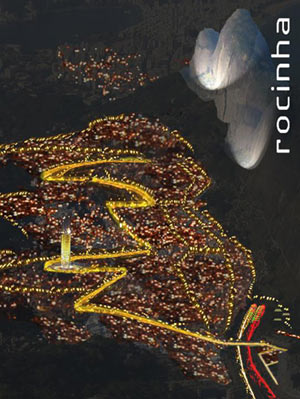| Favelas |
| Elisabeth Blum and Peter Neitzke |
 -
How long have you known Jorge Mario Jáuregui?
-
How long have you known Jorge Mario Jáuregui?
We
contacted Jorge Mario Jáuregui after the German architectural weekly
magazine »Bauwelt« (http://www.baunetz.de/arch/bauwelt/archiv/)
had published as an important news that in December 2000 the Harvard Graduate
School of Design had awarded Jorge Mario Jáuregui the »Veronica
Rudge Green Prize in Urban Design« for a series of projects implemented
through the program »Favela-Bairro«, a collaborative initiative
that has transformed impoverished favelas in and around Rio de Janeiro
into functioning bairros (quarters).
As authors / editors we immediately understood the importance and significance
of this special award and the basic necessity to make Jáuregui’s
activities and projects known in the German speaking world.
We made a first appointment with Jáuregui in order to interview
him. The interview entitled »Rio ist so etwas wie ein Zukunftslaboratorium«
(»Rio as a Future Laboratory«) became a significant part of
our book later on published as »FavelaMetropolis. Berichte und Projekte
aus Rio de Janeiro und São Paulo« (»FavelaMetropolis.
Reports and Projects in Rio de Janeiro and São Paulo«, Basel
(Birkhauser) 2004, see:
http://www.springer.com/dal/home/birkhauser/architecture+&+design?SGWID=1-40463-22-34425332-0).
For the book’s complete contents see: http://www.amazon.de/gp/reader/3764370637/ref=sib_dp_pt/302-4450164-9682411#reader-link
Our first discussion with Jorge Mario Jáuregui (2002) was so impressive
and evidentiary in its arguments that we decided to return to Rio de Janeiro
(2003) in order to meet him a second time and not only to have a several
hours during interview with him to engross the thoughts but also to visit
the places of his urbanistic interventions together with him.
- In what capacity have you known Jorge Mario Jáuregui?
As an extraordinary socially dedicated architect Jáuregui represents for us all the ideas and activities Rem Koolhaas basically misses in the architectural profession (see his essay “What ever happened to Urbanism?”). Koolhaas accuses architects of having withdrawn themselves in the »parasitic security« of architecture instead of acting in sociopolitical contexts concerning urbanistic tasks and thus having brought down the whole profession to total meaningleessness. Particularly seen from an European viewpoint Jáuregui is an outstanding person. Committed to the social and political tasks of the architect’s work he is practicing quite the contrary of the ordinary architect’s attitudes and activities inasmuch he is demonstrating the positive results of social engagement in the field of urbanism.
- What is your opinion of Jáuregui´s contribution to research, thinking and practice in the human settlements?
Jorge
Mario Jáuregui is not only a practicing architect designing urban
projects but likewise a genuine theoretist finding clarifying terms that
are adequate to his challenging urbanistic interventions.
As a creative thinker Jáuregui has for example developed the term
»partido urbanistico«, a kind of key or structural coherent
dispositive through which he formulates every particular project, combining
urbanistic, social, cultural, economic, and ecological aspects in a unique
conceptual formal and spatial configuration. What makes his theoretical
and practical methods intriguing, sophisticated as well as coherent is
their interdisciplinary coaction in the “reading of the existing
site”. His first and most important approach to a new favela urbanization
project always is the question how to »read« the different
»strata« and their correlations:
UN-HABITAT_Lecture_Award_Blum_Neitzke.doc
central
places, physical and social limits and possibilities, waste management,
further ecological aspects etc.
Above all Jáuregui’s urbanistic interventions benefit from
psychoanalysis as science and practice. Jáuregui applies its methods
by distinguishing manifest and latent needs of the favela people as clients.
Thus he emphasizes the traditional relationship between the architect
and his clients by developing the possible options of the latter.
Jorge Mario Jáuregui is an architect who is dedicating his work
– and, as we might add, his life – to a social task of utmost
significance and priority: upgrading, that is to say humanizing life conditions
in Brazilian favelas through urbanistic and architectural interventions
of sustainable quality. Both his activities and his writings show that
and how architects can do more than to design brilliant objects. Internationally
accepted through the Harvard prize Jáuregui demonstrates that architects
can broaden the professional horizon, and that there is always a way to
seize the chance to intervene in given urban and social situations - combining
social commitment, creative methods including forms of cooperation between
planners and clients, and spatial solutions.
Elisabeth Blum and Peter Neitzke